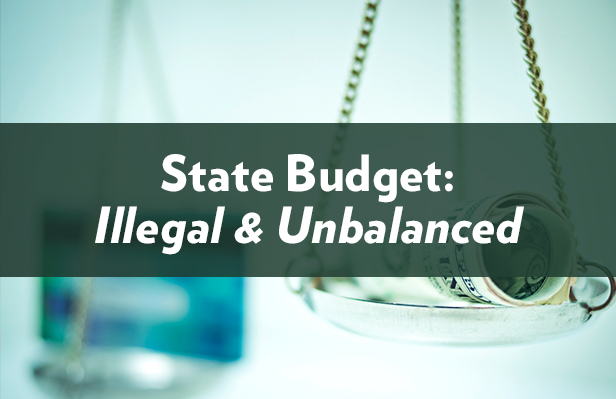Media

Facing Likely Deficit, Lawmakers Should Reduce Spending
Fiscal responsibility is at a premium across the country, and Pennsylvania is no exception.
In June, lawmakers passed a budget that increased spending by $1.6 billion. Weeks later, they passed a revenue package, which included a $650 million tax increase to pay for more spending.
Yet, the budget still remains unbalanced. We have already mentioned how how the fiscal plan relies on a $200 million loan and other questionable revenue assumptions.
Now, a new analysis from the Independent Fiscal Office (IFO) explains that some of the revenue Gov. Wolf and lawmakers are counting on to balance the budget may not materialize.
Below is a look at the projected deficit using the IFO’s numbers, contrasted with the General Assembly’s estimates.
| 2016-17 Budget Picture (in thousands) | ||
| Official Estimates (July 2016) | IFO Estimates (August 2016) | |
| Beginning Balance | $1,991 | $1,991 |
| Total Base Revenue | $31,559,653 | $31,553,400 |
| One-time/New Revenue | $1,216,850 | $957,000 |
| Less Tax Refunds | ($1,300,000) | ($1,300,000) |
| Prior Year Lapses | $57,400 | $57,400 |
| Funds Available | $31,535,894 | $31,269,791 |
| Total Spending | $31,533,732 | $31,533,732 |
| Balance | $2,162 | ($263,941) |
| Sources: Independent Fiscal Office; Senate 2016-17 General Fund Financial Statement | ||
The table contains various assumptions, which explain the differences among estimates:
- The legislature’s base revenue figure (the amount of revenue expected before any policy changes & based on economic growth) is $6 million higher than the IFO’s estimate.
- The most significant difference is between the “One-time/New Revenue” estimates. Lawmakers estimate policy changes will raise approximately $1.2 billion. The IFO, using more reasonable assumptions, projects the changes will raise just $957 million. Here are the major assumptions explaining the disparity:
- The IFO deducts $95 million to pay for the expenses of the Commonwealth Financing Authority (CFA) from sales tax revenue. The legislature moved this line-item out of the General Fund Budget and created a new fund via the fiscal code. Legislative leaders have said they want to pass a gambling expansion to generate $100 million to cover CFA spending, but this is far from certain.
- IFO assumes Act 39 (wine modernization) will raise $73 million in 2016-17. The legislature predicts an increase of $149 million, a $76 million difference.
- IFO projections of tobacco tax revenue (includes taxes on cigarettes, e-cigarettes, loose & roll-your-own tobacco) are approximately $38 million less than the official projections.
- $75 million from the Philadelphia casino is not included in the IFO’s official revenue estimate—they do not expect that to occur during the current fiscal year.
So what’s the major takeaway from the IFO’s estimates? Lawmakers must figure out how to eliminate a $264 million deficit this year. Liquor modernization, tobacco taxes, and gaming may bring in enough revenue to balance the budget, but in the likelihood it doesn’t, lawmakers should be ready to reduce spending to match revenues.